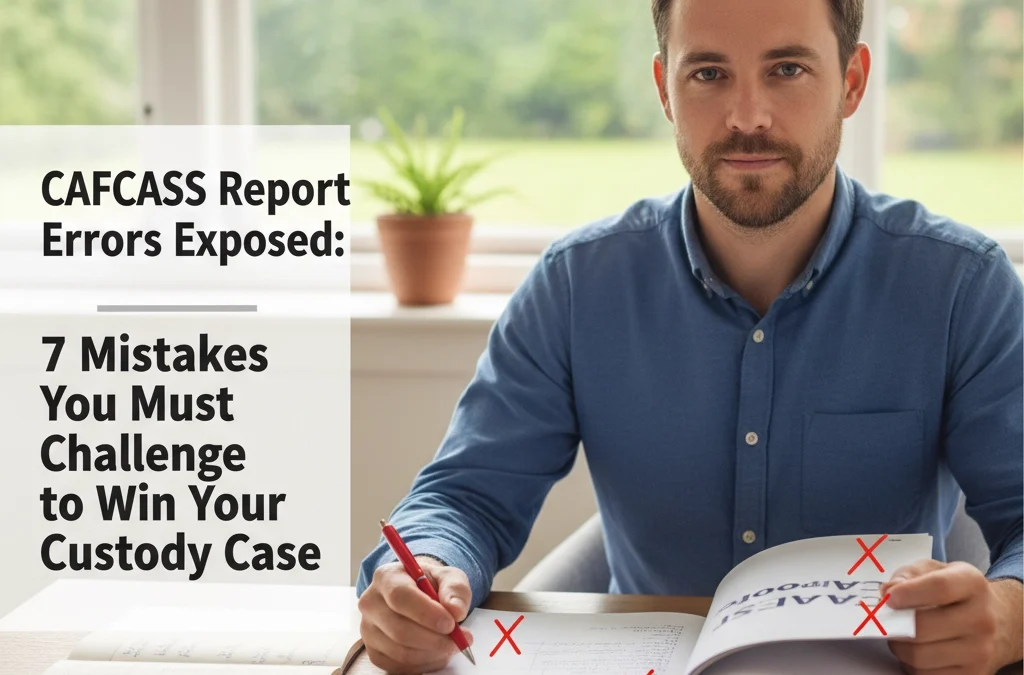Every Dad Matters. When CAFCASS gets it wrong, your children's future hangs in the balance. Today, we're exposing the critical errors that could destroy your custody case: and showing you exactly how to fight back.
CAFCASS reports carry enormous weight in family courts, but they're far from perfect. As fathers fighting for our children, we must understand these flaws and challenge them head-on. Join us as we reveal the seven most damaging mistakes that appear in CAFCASS reports and arm you with the knowledge to protect your family.
The Hidden Truth About CAFCASS Reports
CAFCASS officers are human. They make mistakes. Yet their reports are often treated as gospel truth by family court judges who rely heavily on these assessments to make life-changing decisions about your children.
Fathers United. Rights Respected. We believe every father deserves a fair assessment based on facts, not flawed reporting. Let's expose the errors that could cost you precious time with your children.
Mistake #1: Factual Inaccuracies and Information Misinterpretation

The Problem: CAFCASS officers frequently misinterpret safeguarding information from police and local authorities. This isn't just sloppy work: it's devastating for fathers who find themselves defending against false narratives built on misunderstood facts.
Real Impact: Imagine discovering that your CAFCASS report contains completely inaccurate information about your character, your past, or your relationship with your children. This happens more often than you'd think.
Your Action Plan:
- Request copies of ALL source documents CAFCASS references
- Compare each fact in the report against original documentation
- Document every single discrepancy with timestamps and evidence
- Challenge inaccuracies immediately in writing to CAFCASS
- Prepare a detailed rebuttal for court if necessary
Remember: You have the right to accurate information. Don't let misinterpretation destroy your case.
Mistake #2: Misattribution of Information
The Shocking Reality: CAFCASS reports sometimes contain information about completely different people: particularly when individuals share similar surnames. Your report could include someone else's criminal history, domestic violence allegations, or other damaging information.
Why This Happens: Administrative errors, inadequate verification procedures, and rushed reporting timelines contribute to these catastrophic mix-ups.
Your Defence Strategy:
- Cross-reference every piece of personal information in the report
- Verify dates, locations, and case numbers against your records
- Request proof of identity verification from CAFCASS
- Demand immediate corrections for any misattributed information
- Consider legal action if substantial misattribution occurs
Stand firm: If it's not about you, it doesn't belong in your report.
Mistake #3: Failure to Review Updated Records
The Problem: CAFCASS officers may rely on outdated information, ignoring recent developments that could significantly impact your case. This includes overlooking:
- Updated police checks showing cleared allegations
- Recent court decisions in your favour
- New evidence of your positive parenting
- Changed circumstances that improve your situation
Case Example: One father's report wrongly stated he breached a non-molestation order, despite updated police records confirming he was found not guilty. This error nearly cost him contact with his children.
Your Action Plan:
- Provide CAFCASS with all updated documentation immediately
- Create a timeline of recent positive developments
- Follow up to ensure updates are included in final reports
- Keep detailed records of what you've submitted and when
Mistake #4: Inadequate Record Keeping

The Issue: Poor documentation practices create confusion during court hearings. When CAFCASS cannot provide clear records about their interactions with you, it undermines their credibility and your case.
What Poor Record Keeping Looks Like:
- Missing interview notes
- Unclear contact logs
- Inconsistent reporting between visits
- Lost or incomplete documentation
Your Protection Strategy:
- Keep your own detailed records of every CAFCASS interaction
- Request written summaries after each meeting
- Ask for copies of all notes and assessments
- Document any communication gaps or delays
Remember: If they can't document it properly, their conclusions become questionable.
Mistake #5: Failure to Interview All Relevant Parties
The Gap: While CAFCASS rules don't always require interviewing everyone involved, failing to conduct proper interviews with key parties: including you: can result in incomplete or biased reports.
This Matters Because:
- Your voice might be missing from your own custody assessment
- Important perspectives could be overlooked
- Decisions may be based on one-sided information
- Your parenting capabilities might be misrepresented
Your Rights:
- Request formal interviews if none were conducted
- Insist on adequate time to present your case
- Provide written statements if verbal interviews aren't possible
- Challenge incomplete assessments in court
Mistake #6: Communication Failures and Ignored Correspondence
The Reality: CAFCASS has acknowledged significant problems with correspondence, including unanswered letters, unreturned phone calls, and ignored emails. This directly impacts your ability to participate in your own custody assessment.
Document Everything:
- Keep copies of all correspondence sent to CAFCASS
- Record phone call attempts with dates and times
- Screenshot email delivery confirmations
- Note all instances of ignored communication
Your Response:
- Follow up persistently but professionally
- Copy relevant court officials on communications
- Create a paper trail showing communication attempts
- Raise communication failures with your solicitor
Mistake #7: Overlooking Recent Positive Developments

The Oversight: CAFCASS reports may focus heavily on past issues while failing to acknowledge recent improvements in your circumstances, parenting skills, or living situation.
Common Overlooked Improvements:
- Completed parenting courses
- Resolved housing issues
- New employment or improved financial stability
- Successful anger management or counselling
- Positive references from new support networks
Your Advocacy Strategy:
- Compile comprehensive evidence of all improvements
- Provide character references from credible sources
- Document any completed courses or programmes
- Present evidence of stable housing and income
- Show consistent effort to improve your parenting
How to Challenge CAFCASS Report Errors Effectively
Immediate Action Steps:
- Conduct a Thorough Review: Examine every fact, date, and conclusion in the report
- Gather Counter-Evidence: Collect documentation that disputes any errors
- Submit Formal Corrections: Write to CAFCASS requesting specific amendments
- Prepare for Court: Build a case file showing all identified errors
- Work with Legal Support: Ensure your solicitor understands each error's impact
The Court Challenge Process:
When CAFCASS errors are properly documented and challenged, courts can order corrections. CAFCASS has previously written to courts correcting errors in reports and even provided compensation for distress caused by significant mistakes.
Your Rights and CAFCASS Accountability
Know This: CAFCASS is accountable for their errors. When mistakes are proven, they must take corrective action. This includes:
- Issuing formal corrections to courts
- Amending reports before hearings
- Providing compensation in severe cases
- Acknowledging their errors publicly when necessary
Moving Forward: Your Victory Strategy
Every Dad Matters. Your fight for accurate CAFCASS reporting isn't just about your case: it's about ensuring fair treatment for all fathers navigating the family court system.
Immediate Actions:
- Download and review your CAFCASS report today
- Create a detailed error log if problems exist
- Contact CAFCASS immediately about any inaccuracies
- Build your evidence file systematically
- Connect with other fathers who've faced similar challenges
Long-term Impact:
By challenging CAFCASS report errors, you're not only protecting your own case: you're contributing to improved standards that benefit all fathers. Every successful challenge makes CAFCASS more accountable and more careful.
Join Our Movement for Accurate Reporting
Fathers United. Rights Respected. We're building a community of fathers who refuse to accept flawed CAFCASS reports. Together, we're demanding accuracy, accountability, and fair treatment in family court assessments.
Share your experiences with CAFCASS report errors. Connect with fathers who've successfully challenged inaccurate reports. Learn from our collective knowledge and strength.
Your children deserve accurate information in their custody case. You deserve fair treatment. We're here to ensure you get both.
Ready to challenge CAFCASS report errors in your case? Every father's fight for accuracy makes the system better for all of us. Join us in demanding the truth: because Every Dad Matters, and Fathers United. Rights Respected.

